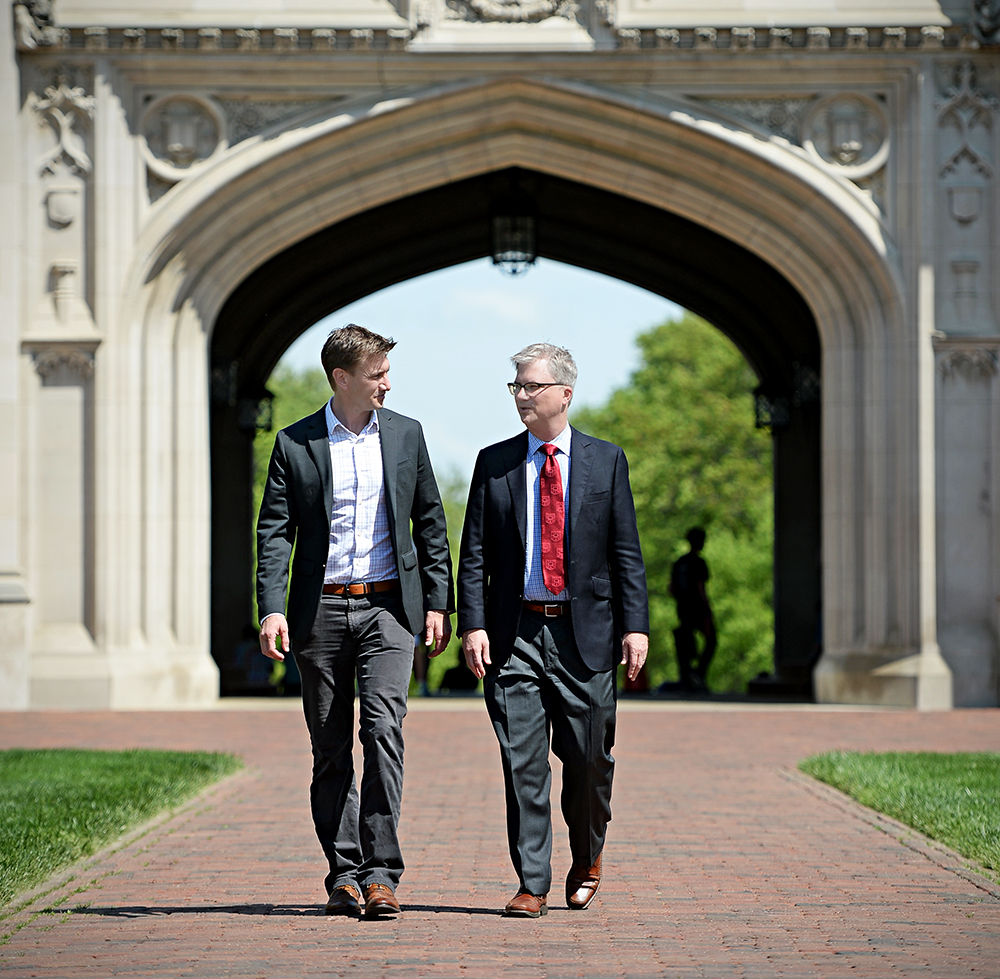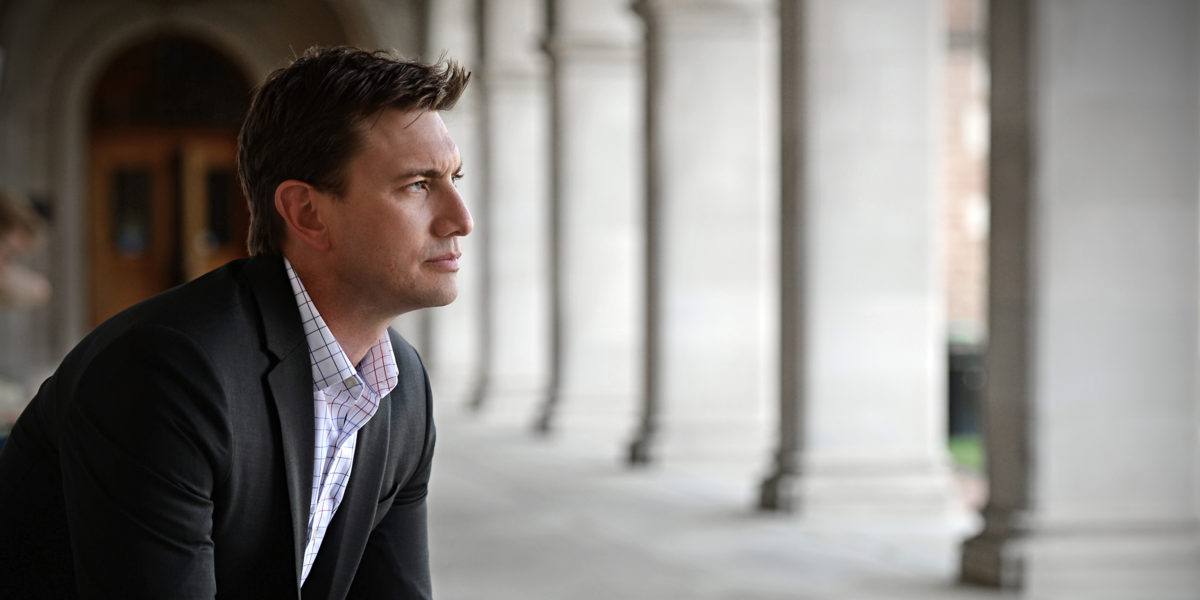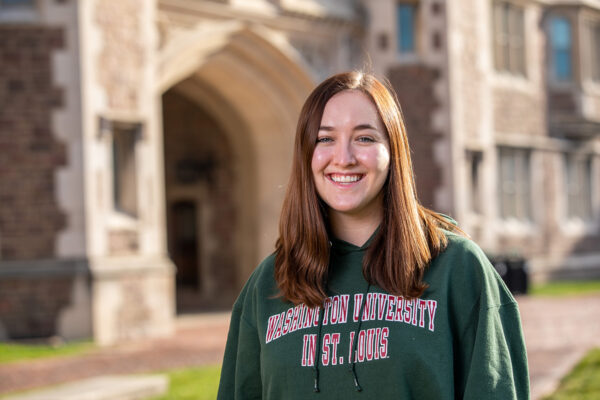James Petersen enrolled at the Brown School at Washington University in St. Louis to learn how to treat veterans like him — combat soldiers struggling to adjust to life back home. But he will graduate with a new mission: helping soldiers chart a path forward through higher education.
“I came to WashU convinced that I didn’t belong here; that no one got me,” Petersen said. “Connecting with other veterans changed everything for me. I want to give other veterans that support and the resources they need so they can succeed in college.”
Petersen is the president of WUVets, a student group devoted to serving student veterans. In the past, that has meant hosting an annual Veterans Day event, organizing a gift drive to benefit local vets and getting members together every so often for beers.
Petersen wanted to do that and more. Yes, he would organize the 2016 Veterans Day reception, but this one would feature U.S. Sen. Claire McCaskill (D-Mo.) and a panel of decorated veterans. Yes, he would join Student Veterans of America (SVA). And then, a mere six months later, he would accept the Chapter of the Year Award at SVA’s annual convention. And, he would help launch the first Veterans Week, but not just for Washington University students. Students from here, Saint Louis University and the University of Missouri-St. Louis would come together for service, networking and educational opportunities.
“As our numbers grow, so has our commitment to the university and each other,” Petersen said.
In February, he and fellow WUVets members Gerard Tate and Jen Goetz of the Brown School would tell Provost Holden Thorp and Henry Webber, executive vice chancellor for administration, that despite WUVets gains, the university must do more to recruit and support veterans: because veterans deserve it, because veterans make WashU better.
“We didn’t gloss over the facts,” Petersen said. “The truth is, Washington University is a leader in so many areas, but there is much, much more that the university can do for veterans. These men and women are our future business leaders and politicians, and we need them here.”
Webber and Thorp, both of whom were raised in military families, agreed.
“We heard our fathers speaking through James,” Webber said. “We are blessed by the presence of veterans on our campus. We knew James was right — increasing the number of veterans on our campus would be good for them, but it would be enormously good for the entire university. He gave us a lot to consider.”
Finding others like him
Petersen grew up in Collinsville, Ill., and liked to run through the woods with a stick and fight imaginary battles. A good student from a middle-class family, Petersen had the option to go to college. But he chose the military instead, enlisting in the Marines in 1999.
“I liked that they were so elite: ‘The few, the proud … ,’” Petersen said. “That’s how I saw myself.”
Petersen was deployed to Fallujah, Iraq, in 2004, and ultimately was assigned to protect the infamous Abu Ghraib prison. For decades, Saddam Hussein had tortured his enemies there.
“The wild dogs would dig up bones from the mass graves and bring them to you,” Petersen said. “The place was just steeped in evil. It was attacked every single day — by car bombs, rockets, mortars, rocket-propelled grenades. The whole site was about the size of the buildings that make up the Brown School on the south side of the Danforth Campus, so when it got attacked, you felt it.”
Petersen came back to the States, like so many soldiers, with post-traumatic stress disorder. And like so many soldiers, he struggled to recover. Any number of sounds — fireworks exploding, garbage trucks driving by, baseball bats connecting with balls — could trigger an attack.
Petersen sought therapy from the U.S. Department of Veterans Affairs, and it worked. He stopped snapping at loved ones and started hanging out with friends. Finally, he could shop at Costco and attend games at Busch Stadium, both venues that previously sparked panic attacks. Further, he wanted other vets to feel the same relief, so he decided to study social work. The Brown School offered the most money and the best opportunities. Petersen excelled academically but still felt isolated socially.
“I needed to find others like me — people who weren’t your traditional sort of student, people who could help me figure out the red tape required to use my V.A. benefits, people who cared,” Petersen said.
‘There is no one veteran experience’
So did Goetz, an Air Force veteran. Goetz never saw combat and did not struggle with many of the challenges Petersen confronted. Still, WUVets provided her friendship and support.
“I didn’t even know there was an organization,” Goetz said. “But once I did, I was like, ‘Where have you guys been?’ It has made my last year here really awesome.”
She and Petersen worked with Danielle Bristow, assistant dean for academic affairs at the Brown School, and Ashley Macrander, assistant dean for graduate student affairs at The Graduate School, to bring Veteran Ally training to Brown faculty and staff. The program, which provides employees a better understanding of the issues veterans face in college, launches next semester.
Goetz believes an office of veteran affairs could provide programs and services like Veteran Ally training to the entire university community. A dedicated office also could recruit more veterans, ease their transition to college, help veterans access benefits and connect students.
Such an office would support Washington University in its effort to be more diverse and inclusive.
“There is no one veteran experience,” Goetz said. “We didn’t all go to combat. We don’t all look a certain way. We are not all G.I. Joe’s. We all had different experiences in the military. And we all have learned different things and can contribute in different ways.”
Veterans say Olin Business School has mastered how to both educate veterans and leverage their experiences. It boasts 22 veterans in its full-time MBA program and some 75 veterans in its part-time and executive MBA programs and Brookings Executive Education program in Washington, D.C. Olin connects prospective students to the Olin Veterans Association, hosts a two-day boot camp for incoming students, sponsors events for veterans’ family members and employs a specialist to help veterans access financial aid. Most important, Olin makes a huge financial commitment to veterans, covering whatever tuition costs are not covered by government benefits. In most cases, that’s about half of Olin’s tuition.
Kurt Dirks, professor of organizational behavior at Olin and former interim dean, said Olin recruits veterans for three reasons: It is committed to serving those who have served our nation; veterans create a strong classroom culture; and veterans possess the skills many of Olin’s corporate partners want. Indeed, an internal study of student veterans at Olin found veterans outperform the average student in both the classroom and job market.
“Veterans help our faculty and students realize Olin’s values of leadership, integrity, collaboration and excellence,” Dirks said. “And, quite frankly, they offer perspectives other students do not have.”
For instance, when Dirks led a class on putting together a team under pressure, the veterans shared what they learned on the battlefields of Iraq and Afghanistan.
“The other students were in awe of the life-and-death decisions the veterans had made,” Dirks said. “Those types of conversations happen all of the time at Olin because of our veterans.”

Keeping the momentum going
So what would it take for those conversations to happen campuswide?
WUVets has identified key goals. It recommends that the university take an inventory of current veterans and existing resources and then identify obstacles — financial and otherwise — that hinder student success.
‘Veterans bring special life experiences to Washington University, but they also have special requirements. By establishing this role, Washington University will serve those needs just as our veterans have served our country.’
Provost Holden Thorp
Next, it encourages the university to recruit both undergraduate and graduate students at career-day events on military bases and to partner with existing programs, such as the Warrior Scholar Project and Service to School, to prepare veterans without a college degree for the rigors of an elite university.
And, finally, it recommends the university develop programs with peer-to-peer mentoring, group counseling, new student orientation and other initiatives to help veterans thrive at Washington University.
This month, Webber and Thorp got back to WUVets with good news. Chancellor Mark S. Wrighton approved the creation of a new position in the Provost’s Office for veterans and active members of the military. Thorp said the decision is a big step forward for a university committed to recruiting a diverse student body and supporting those students through services, resources and programs that meet their unique needs.
“We want to expand access on every front and that includes student veterans,” Thorp said. “Veterans bring special life experiences to Washington University, but they also have special requirements. By establishing this role, Washington University will serve those needs just as our veterans have served our country.”
Petersen is thrilled with the university’s quick and thoughtful response. Indeed, he plans to apply for the position. He also is weighing other offers to serve veterans.
“If I have learned one thing about myself, it is that I need to serve,” Petersen said.
Read more Class Acts, our outstanding graduates of 2017, here.

